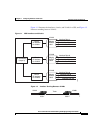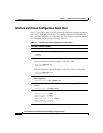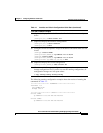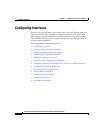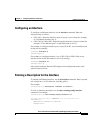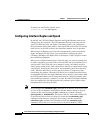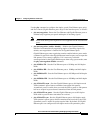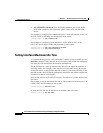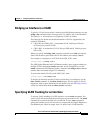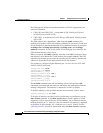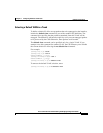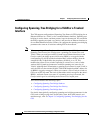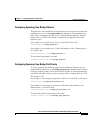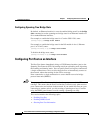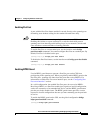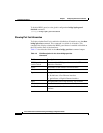
1-11
Cisco Content Services Switch Routing and Bridging Configuration Guide
OL-4580-01
Chapter 1 Configuring Interfaces and Circuits
Configuring Interfaces
Bridging an Interface to a VLAN
To specify a VLAN and associate it with the specified Ethernet interface, use the
bridge vlan command. Enter an integer from 1 to 4094 as the VLAN identifier.
The default is 1. All interfaces are assigned to VLAN1 by default.
The following list defines the maximum number of VLANs supported by the
specific CSS models:
• CSS 11501 and CSS 11503 - A maximum of 256 VLANs per CSS and
64 VLANs per port (FE or GE)
• CSS 11506 - A maximum of 512 VLANs per CSS and 64 VLANs per port
(FE or GE)
When you specify the bridge vlan command, enter the word vlan in lowercase
letters and include a space before the VLAN number (for example, vlan 2).
For example, to configure e1 to VLAN2 on the CSS 11501, enter:
(config-if[e1])# bridge vlan 2
The CSS Gigabit Ethernet and Fast Ethernet interface ports support trunking to
multiple VLANs through the trunk command. In this configuration, use the
trunk command for the Ethernet interface instead of the bridge vlan command
(and the other associated bridge CLI commands).
To restore the default VLAN1 on the CSS 11501, enter:
(config-if[e7])# no bridge vlan
To display all interfaces and the VLANs to which they are configured, use the
show circuit command. In the show circuit display, VLANs appear as VLAN
(uppercase, with no space before the VLAN number). See the “Showing Circuits”
section for information about the show circuits command.
Specifying VLAN Trunking for an Interface
To activate VLAN trunking for a CSS interface, use the trunk command. You
specify all VLANs that include the specified port as part of the VLAN. The trunk
command also converts the link in to a trunk link. Use the vlan command to
specify the number of each VLAN to be associated with the Gigabit Ethernet or
Fast Ethernet port. Enter an integer from 1 to 4094 as the VLAN identifier.



